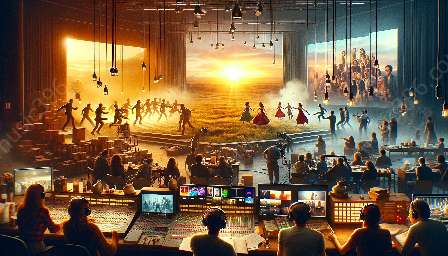Pop music has been an integral part of society for decades, influencing culture, societal norms, and individual behavior. The evolution of pop music has mirrored the changes and developments in society, reflecting the societal shifts, values, and ideologies of different eras.
The Birth of Pop Music
Pop music originated in the 1950s, drawing from various musical styles such as rock and roll, rhythm and blues, and country. Artists like Elvis Presley, Chuck Berry, and Little Richard played a pivotal role in shaping the early pop music scene, introducing a new sound and style that resonated with a younger audience.
Impact on Culture and Society
Pop music has played a significant role in shaping popular culture and influencing societal trends. It has been a driving force behind various cultural movements, fashion trends, and youth subcultures. The music itself has served as a reflection of society's values, attitudes, and struggles, often providing a platform for artists to address issues such as civil rights, gender equality, and political change.
Revolutionizing the Music Industry
The evolution of pop music has revolutionized the music industry, serving as a catalyst for technological advancements and new business models. From vinyl records to digital streaming platforms, the way music is consumed and distributed has been radically transformed, creating new opportunities for artists to reach wider audiences and for fans to engage with their favorite music in innovative ways.
Influence on Individual Behavior
Pop music has the power to influence individual behavior, attitudes, and emotions. Whether it's through empowering lyrics, catchy melodies, or compelling storytelling, music has the ability to shape the way people think, feel, and act. It has provided individuals with a means of self-expression and identification, allowing them to connect with others who share similar experiences and sentiments.
Controversies and Criticisms
While pop music has been celebrated for its impact on society, it has also faced criticism and controversy. The commercialization of pop music, celebrity culture, and the focus on image and marketability have been subject to scrutiny, with some arguing that the authenticity and artistic integrity of the music have been compromised.
Modern Influences and Trends
In today's digital age, pop music continues to evolve and adapt to the changing landscape of society. Social media, streaming platforms, and globalization have expanded the reach and influence of pop music, enabling artists to connect with fans from diverse cultural backgrounds and geographical locations.
Furthermore, the rise of social and political movements has seen pop music become a platform for advocacy and social change. Artists are using their platform to address pressing issues such as mental health, climate change, and social justice, harnessing the power of music to raise awareness and inspire action.
Conclusion
The evolution of pop music has left an indelible mark on society, shaping cultural landscapes, influencing individual behavior, and serving as a reflection of the ever-changing human experience. As pop music continues to evolve, its impact on society will undoubtedly persist, inspiring, challenging, and resonating with generations to come.























